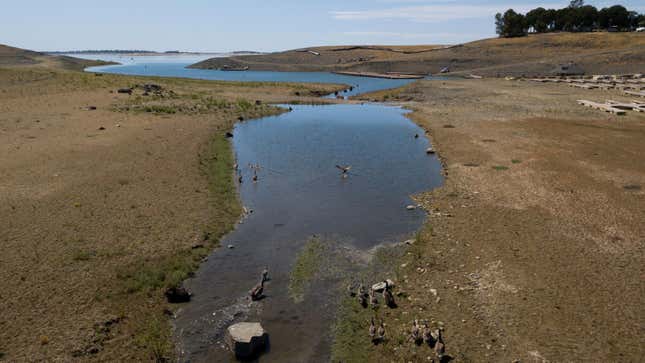
The record-setting drought in California has brought water levels to new lows. Now, dropping reservoir levels may have helped solve the mystery of a plane that crashed 56 years ago.
Two workers from an underwater surveying company were doing testing at Folsom Lake last week where water levels have reached their shallowest levels on record. As they were conducting their work, their sonar device picked up a strange piece of debris. When they inspected it further, they found it appeared to be a small aircraft.

Seafloor Systems’ sonar imaging shows the outlines of a plane lying 160 feet (49 meters) below the lake’s surface, in the deepest part of the body of water. Normally, those depths would likely be impossible to scan even with sonar imaging, but the drought’s impact on the lake helped them get a clear picture of the plane’s tail and propeller.
Unfortunately, the low waters also left the water particularly murky and full of silt, so the technicians couldn’t get a clear look inside the cabin or find an aircraft number. But they said it sure looks a lot like a Piper Comanche 250 plane, the same model that crashed into Folsom Lake on New Year’s Day in 1965 and killed four people.
“The sonar gave us about 100 feet of range; you could see the plane as clear as day,” Josh Tamplin, Seafloor Systems CEO, said to local station KRON4. “We could see the fuselage here, we could see the right wing. We could see the tail.”

Before the workers found the suspected remains of the plane, only one victim’s body, the pilot, had been recovered from the crash. The victims’ loved ones said the lack of clarity has haunted them for decades.
“He didn’t really know his brother, but him and his mom would go out to the lake periodically when the water was low and look around to see if they could see anything,” Katherine Radican said of her husband, whose brother perished in the crash, to ABC News. (Her husband sadly passed away nearly three years ago.)
Local sheriffs’ offices plan to meet with Seafloor Systems representatives next week to see how they can work together to pull the plane out of the water. If it turns out to be the wrecked aircraft, it may help the affected families to finally find closure.
Right now, Folsom Lake is at less than half its capacity because the Sierra snowpack that normally feeds it was abysmal this year. At the start of this month, the snowpack was at 0% of its average June 1 levels, indicating that snow had already entirely melted at monitoring sites. On top of a low snow year, extreme heat is largely to blame. Both are hallmarks of the climate crisis; California is seeing more extreme dry and wet years while rising temperatures wreak havoc on what precipitation does fall. With record heat arriving across the West this week, the unprecedented dry conditions are only expected to get worse.
The Seafloor Systems workers’ discovery is the latest example of the strange ways that the climate crisis is revealing fragments of history. Last month, thawing frost in the Italian Alps allowed researchers to unearth World War I relics that were previously hidden. In summer 2018, drought and heat grew so extreme in the UK that the outlines of ancient buildings thousands of years old appeared in farmers’ fields.
If the recovered plane ends up bringing families closure, we should celebrate that. But we should also remember that the historic drought conditions are also making it impossible for endangered salmon to swim along their traditional paths, forcing farmers to rip up their crops, and threatening to spur more deadly wildfires across California. And the dry season is just getting started.